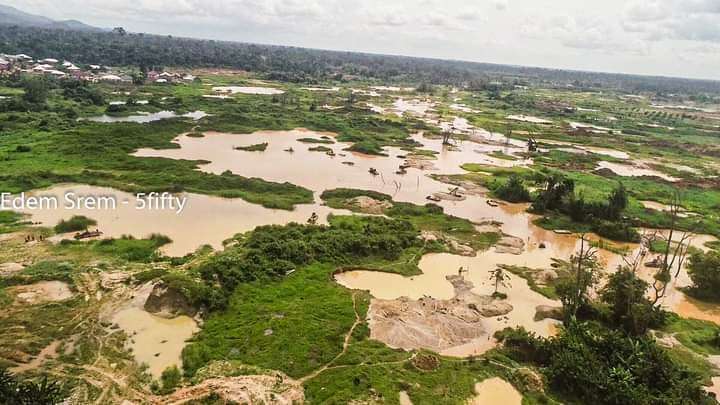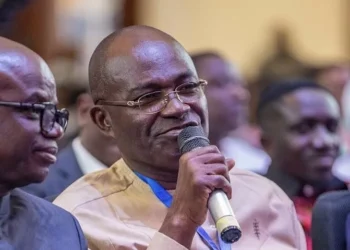The Executive Director of Africa Education Watch (EduWatch), Kofi Asare, has strongly criticized the government’s silence and lack of action following recent scientific findings that revealed alarming levels of heavy metal contamination in major foodstuffs across six regions of Ghana due to illegal mining, commonly known as galamsey.
In a strong critique, “Ghana: Land of Our Death,” Mr. Asare lamented the government’s apparent indifference to what he described as a full-blown public health emergency.
“Scientists have found that major foodstuffs in six regions are contaminated with heavy metals from galamsey,” he said, warning that the contamination goes beyond the areas directly affected by illegal mining.
According to Mr. Asare, although the study did not include the Greater Accra Region, its residents are not immune to the danger.
“As a farmer, I know that many of the vegetables we eat in Accra come from the Eastern Region, a galamsey hub, all the way to Navrongo. To wit, it doesn’t matter which region you are in. We are all exposed”.
Kofi Asare, Executive Director Africa Education Watch
He underscored that the country is facing a slow and silent health catastrophe, as the medical community has linked exposure to galamsey-related toxins to several life-threatening diseases, including cancers and kidney failure.

“These diseases are rising sharply, killing daily,” he warned, arguing that Ghana’s food supply system has become a conduit for toxins, endangering millions.
Mr. Asare faulted the government for failing to treat the research findings with the urgency they deserve. “In any serious country, this research finding would have triggered a national food health emergency,” he asserted. He explained that, in such circumstances, immediate nationwide interventions should have been deployed to protect consumers.
“Mobile testing units would immediately be deployed to major markets to test for heavy metals in foodstuffs before they are cleared for sale. It’s just like finding expired canned food on the shelves. Immediately, search, trace, and prevent sale or consumption.”
Kofi Asare, Executive Director Africa Education Watch
Markets Tour Confirms No Action
The EduWatch Director revealed that since the research findings were released, he had personally toured major markets in Madina, Dodowa, Ogbojo, Osino, and Koforidua to observe what measures, if any, had been implemented to ensure food safety, but to his disappointment, he found that nothing had been done to protect public health.
Mr. Asare expressed skepticism about the capacity of the National Anti-Illegal Mining Operations Secretariat (NAiMOS) to protect Ghanaians from the public health risks posed by contaminated food.

“All we hear is NAIMOS. But how does NAIMOS ensure that poisoned food doesn’t end up on our plates?” he questioned, pointing to institutional gaps and lack of accountability.
He did not spare the country’s political leadership, especially the Ministers of Agriculture and Health, whom he accused of indifference and misplaced priorities. “Pathetic leadership from our Agriculture and Health Ministers. They don’t care about our lives; only our votes,” he declared.
The EduWatch Executive Director stressed that Ghana’s leadership has repeatedly failed to confront the galamsey menace with the seriousness it demands, allowing greed and political expediency to take precedence over national survival.
Mr. Asare’s comments come amid growing public concern over the far-reaching consequences of illegal mining on Ghana’s water bodies, food security, and public health.
Despite numerous promises by successive governments to tackle galamsey, the practice continues to thrive, driven by political protection, weak enforcement, and institutional complicity.
Health experts have repeatedly warned that crops cultivated in contaminated soils or irrigated with polluted water accumulate toxic heavy metals such as mercury, arsenic, and lead, which can cause severe health effects when consumed over time. However, no coordinated policy response has been announced since the publication of the study confirming widespread contamination.

Civil society groups have also called for a nationwide campaign to trace the sources of contaminated produce, strengthen food safety regulations, and introduce rigorous testing mechanisms at markets and border entry points. But for now, as Kofi Asare noted, ordinary Ghanaians continue to consume food that may slowly be poisoning them.
His statement, echoing frustration shared by many citizens, concludes with an urgent plea for national awakening. For Mr. Asare, the choice before Ghana is clear — act decisively to protect lives, or perish under the weight of greed and official neglect.
READ ALSO: Deloitte Report Warns: High Costs Threaten West Africa’s Oil Competitiveness






















